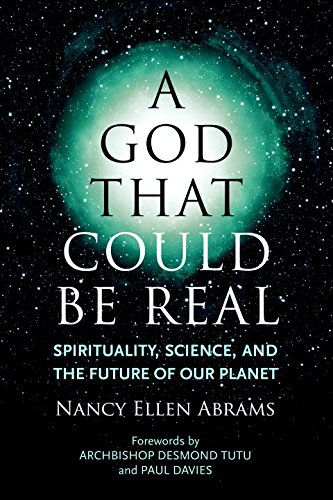
A paradigm-shifting blend of science, religion, and philosophy for agnostic, spiritual-but-not-religious, and scientifically minded readers
Many people are fed up with the way traditional religion alienates them: too easily it can perpetuate conflict, vilify science, and undermine reason. Nancy Abrams, a philosopher of science, lawyer, and lifelong atheist, is among them. And yet, when she turned to the recovery community to face a personal struggle, she found that imagining a higher power gave her a new freedom. Intellectually, this was quite surprising.
Meanwhile her husband, famed astrophysicist Joel Primack, was helping create a new theory of the universe based on dark matter and dark energy, and Abrams was collaborating with him on two books that put the new scientific picture into a social and political context. She wondered, “Could anything actually exist in this strange new universe that is worthy of the name ‘God?’”
In A God That Could Be Real, Abrams explores a radically new way of thinking about God. She dismantles several common assumptions about God and shows why an omniscient, omnipotent God that created the universe and plans what happens is incompatible with science—but that this doesn’t preclude a God that can comfort and empower us.
Moving away from traditional arguments for God, Abrams finds something worthy of the name “God” in the new science of emergence: just as a complex ant hill emerges from the collective behavior of individually clueless ants, and just as the global economy emerges from the interactions of billions of individuals’ choices, God, she argues, is an “emergent phenomenon” that arises from the staggering complexity of humanity’s collective aspirations and is in dialogue with every individual. This God did not create the universe—it created the meaning of the universe. It’s not universal—it’s planetary. It can’t change the world, but it helps us change the world. A God that could be real, Abrams shows us, is what humanity needs to inspire us to collectively cooperate to protect our warming planet and create a long-term civilization.

God as an Emergent phenomenon The premise of this book fascinated me, so I had to read it.
Abrams invents a God to meet her need for a Higher Power. But why? Nancy Abrams has an eating disorder. As part of her recovery, her support group (as with AA) asked her to work with a “Higher Power.” At the time, Abrams didn’t believe in any “traditional” concept of God, but she came to believe that a belief in a Higher Power was essential to her recovery. Influenced by her husband’s background (astrophysicist), she couldn’t bring herself to lie regarding her beliefs (she grew up in a religious household, and became a nonbeliever at an early age). So she…
“Worthy”? That’s a basis for epistemology?? This is embarrassingly bad. I had hoped that this might deserve an in-depth critique, but such aspiration vanished in the first 40 pages. PZ Myers has sliced and diced this pretty effectively over at his blog (Pharyngula), so I’ll be brief. I skipped a bit, so I apologize for any errors.